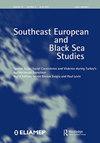Battle for the European Union in the periphery: contestation dynamics and domestic debates
IF 0.8
2区 社会学
Q2 AREA STUDIES
引用次数: 0
Abstract
ABSTRACTConnected by a shared endeavour to enhance understanding of the forces that shape contestation toward the EU in its peripheries and unprohibited in approach, this special section explores the concepts of contestation and periphery. Using various methodological approaches, the section showcases a series of overlapping and cross-cutting themes which contextually strengthen the phenomenon and experiences of contestation in peripheral states. In aggregating these themes, the authors attribute contestation to the growing ‘absence’ of the EU’s normative interest in peripheral states and the growing transactional/functional features that define peripheral state relationships with the EU. The authors draw attention to the opportunities for regional rivals, such as Russia and China to capitalize on the absence of the EU’s transformative power in peripheral states, the role of domestic forces in utilizing contestation as a means to preserve regime type and satisfy sovereignty concerns, and the incidences of peripheral states in shaping/reshaping their foreign policy positions in response to the Russia-Ukraine War. Taken together, our special section shows that contestation in Europe’s periphery is less an overt normative resistance against the EU and more an absence of EU normative efforts in peripheral states and the increasingly functional features which define peripheral states’ relationships with the EU.KEYWORDS: European UnionEuropeanizationcontestationperiphery AcknowledgementsWe extend our gratitude to Başak Alpan, Senem Aydın Düzgit, Thomas Diez, and Simon Usherwood for their valuable contributions and insightful feedback during the preparation of this special section. Additionally, we would like to express our appreciation to Ioannis N. Grigoriadis and Ümit Erol Aras for their unwavering support throughout the publication process.Disclosure statementNo potential conflict of interest was reported by the authors.Notes1. For the details about ‘the Linking to Europe at the Periphery Project’, please visit: https://www.leapjmnetwork.com/about2. Part of this aim was fulfilled by a workshop organized in Eskişehir on 15–16 October 2022 with the title of Contesting ‘Europe’ at the Periphery, for further details and the program, please visit: https://www.leapjmnetwork.com/activity/w3Additional informationNotes on contributorsAli Onur ÖzçelіkAli Onur Özçelik is an Associate Professor and a full-time Lecturer in the International Relations Department at Eskisehir Osmangazi University. After earning his Ph.D. in the Department of Politics at the University of Sheffield, he has focused his research on the politics of non-state actors, transnational social movements, diplomacy for non-state actors, and states with limited recognition, as well as the European Union’s Neighborhood Policy. He co-edited two books, namely “The World Community and the Arab Spring” (Palgrave) and “EU Conditionality in Turkey: When Does It Work? When Does It Fail?” (Rowman & Littlefield). Özçelik has also served as a researcher for the Jean Monnet Networking Project known as “Linking to Europe at the Periphery” (LEAP).Kadri Kaan RendaKadri Kaan Renda is an assistant professor in the department of international relations at Hacettepe University, Ankara. Renda holds a PhD in European and International Studies from Kings College London. He received his master’s degree in European Studies from the University of Essex. He has been giving lectures on Turkish foreign policy, the European Union, and Research Methods at Hacettepe University. His research interests are Turkish foreign policy, the common foreign and security policy of the EU, and security studies.Anthony CostelloAnthony Costello is a lecturer of politics and international relations in Liverpool Hope University. He holds a PhD in European Integration and Governance from University College Cork (UCC), an MSc in Nationalism and Ethno-communal Conflict Resolution from University College Dublin (UCD) and a BA (Hons) in Politics and Philosophy from University College Dublin (UCD). His research interests include patterns of European integration and EU policy-making methods, fiscal governance in the EU, EU foreign policy processes, and the future of Europe. He has published work on the EU Fiscal Stability Treaty, the European Neighborhood policy and Ireland and the Future of Europe.欧盟在外围的战斗:争论的动态和国内辩论
摘要本专题探讨了争论和边缘的概念,通过共同努力加强对欧盟外围和不受禁止的方法中形成争论的力量的理解。本节使用各种方法方法,展示了一系列重叠和交叉的主题,这些主题在背景上加强了外围国家的争论现象和经验。综合这些主题,作者将争论归因于欧盟对周边国家规范性利益的日益“缺失”,以及定义周边国家与欧盟关系的日益增长的交易/功能特征。作者提请注意区域竞争对手(如俄罗斯和中国)利用欧盟在周边国家缺乏变革力量的机会,国内力量在利用争端作为维护政权类型和满足主权关切的手段方面的作用,以及周边国家在应对俄乌战争时塑造/重塑其外交政策立场的事件。综上所述,我们的特别部分表明,欧洲外围国家的争论与其说是对欧盟的公然规范抵制,不如说是外围国家缺乏欧盟的规范努力,以及定义外围国家与欧盟关系的日益功能性特征。感谢ba ak Alpan、Senem Aydın dzgit、Thomas Diez和Simon Usherwood在本专题准备过程中提供的宝贵意见和深刻反馈。此外,我们要感谢Ioannis N. Grigoriadis和Ümit Erol Aras在整个出版过程中的坚定支持。披露声明作者未报告潜在的利益冲突。有关“欧洲外围项目链接”的详细信息,请访问:https://www.leapjmnetwork.com/about2。2022年10月15日至16日在埃斯基谢希尔举办的题为“边缘的欧洲”的研讨会实现了这一目标的一部分,欲了解更多细节和计划,请访问:https://www.leapjmnetwork.com/activity/w3Additional关于贡献者的说明sali Onur ÖzçelіkAli Onur Özçelik是埃斯基谢希尔Osmangazi大学国际关系系的副教授和全职讲师。在谢菲尔德大学政治系获得博士学位后,他的研究重点是非国家行为者的政治、跨国社会运动、非国家行为者的外交、有限承认的国家以及欧盟的邻国政策。他与人合编了两本书,分别是《世界共同体与阿拉伯之春》(帕尔格雷夫出版社)和《欧盟对土耳其的限制:何时起作用?》什么时候会失败?(罗曼和利特菲尔德)。Özçelik还曾担任让·莫内网络项目“连接欧洲外围”(LEAP)的研究员。Kadri Kaan Renda是安卡拉Hacettepe大学国际关系系助理教授。Renda拥有伦敦国王学院欧洲和国际研究博士学位。他在埃塞克斯大学获得欧洲研究硕士学位。他一直在Hacettepe大学讲授土耳其外交政策、欧盟和研究方法。主要研究领域为土耳其外交政策、欧盟共同外交与安全政策以及安全研究。安东尼·科斯特洛是利物浦霍普大学政治和国际关系讲师。他拥有科克大学(UCC)的欧洲一体化与治理博士学位,都柏林大学(UCD)的民族主义和种族-社区冲突解决硕士学位,以及都柏林大学(UCD)的政治与哲学(荣誉)学士学位。他的研究兴趣包括欧洲一体化模式和欧盟政策制定方法、欧盟财政治理、欧盟外交政策进程以及欧洲的未来。他发表了《欧盟财政稳定条约》、《欧洲邻国政策》和《爱尔兰与欧洲的未来》等著作。
本文章由计算机程序翻译,如有差异,请以英文原文为准。
求助全文
约1分钟内获得全文
求助全文
来源期刊

Southeast European and Black Sea Studies
AREA STUDIES-
CiteScore
3.00
自引率
19.00%
发文量
73
期刊介绍:
The aim of the journal is to establish a line of communication with these regions of Europe. Previously isolated from the European mainstream, the Balkan and Black Sea regions are in need of serious comparative study as are the individual countries, no longer "at the edge" of Europe. The principal disciplines covered by the journal are politics, political economy, international relations and modern history; other disciplinary approaches are accepted as appropriate. The journal will take both an academic and also a more practical policy-oriented approach and hopes to compensate for the serious information deficit on the countries under consideration.
 求助内容:
求助内容: 应助结果提醒方式:
应助结果提醒方式:


